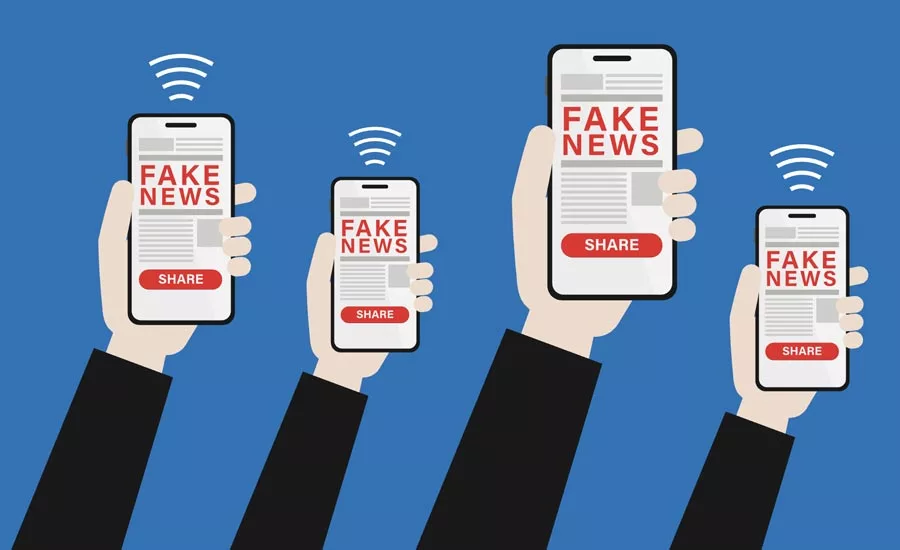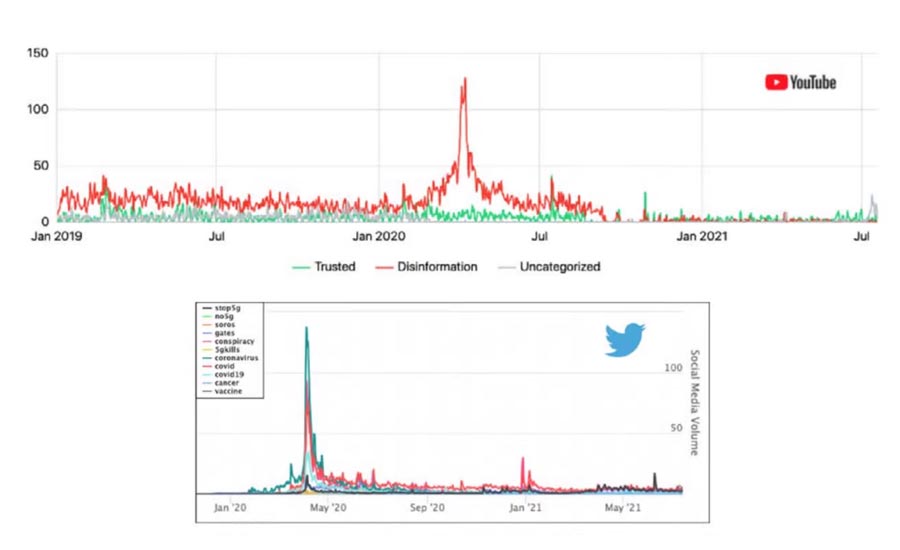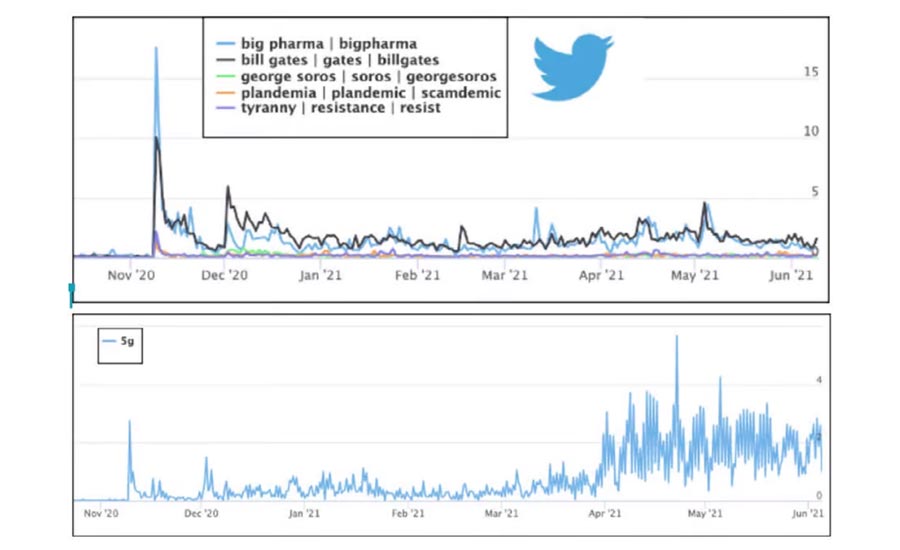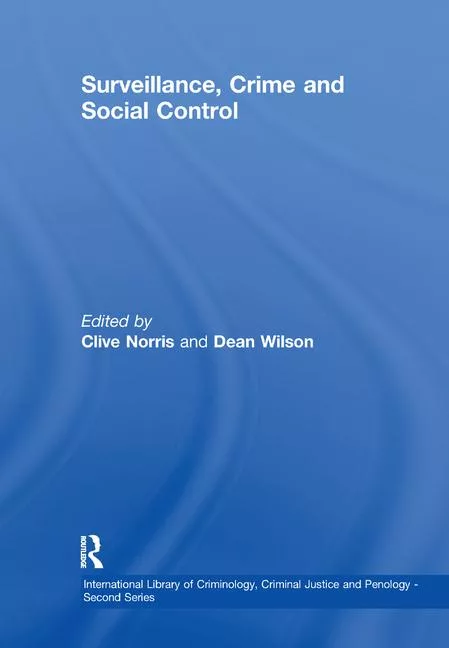Disinformation campaigns against brands are flourishing across social media

To showcase the increase in disinformation campaigns targeting corporations, the NCRI first sought to quantify the scale and structure of the makeup of information operations and conspiracy for 5G technology, which has been targeted by Russia and China, as a means to discredit western 5G technology and promote their own technologies.
With assistance from partners, open-source platform analysis, and NCRI’s flagship platform, Pushshift, NCRI identified over 600,000 articles mentioning 5G published between January of 2019 and July of 2021, with roughly 70,000 from known sources of disinformation. Although the majority of articles mentioning 5G were from trusted sources (CNN, FOX Business, WSJ, etc.), the most cited articles mentioning 5G are from known Russian disinformation sources, including the entities, Global Research and RT, and non-state actors like Natural News and Children’s Health Defense, the NCRI say.
NCRI also analyzed over 17 million Twitter posts mentioning 5G between July of 2018 and July 2021. Starting with the COVID-19 pandemic, tweets mentioning 5G have included terms like stop5g, 5gkills, soros, gates, cancer, coronavirus and others. These developments showcase the flexibility of movements enabled by disinformation against brands, according to the NCRI.

Figure 1 — A partial time series analysis of multiple YouTube videos (top) and hashtags tweeted per minute (bottom) mentioned with 5G. Conspiracy theories and disinformation around 5G appear to emerge in synchrony across platforms and show steep increases in response to the advent of the COVID-19 pandemic. Image courtesy of the NCRI
NCRI also examined anti-vaccination disinformation Russian campaigns that seek to degrade Western vaccine confidence and promote Russia’s Sputnik V vaccine. To gauge the information landscape related to American vaccines, NCRI identified over 4 million articles since January of 2020 mentioning American pharmaceutical companies involved in COVID-19 vaccine production (Moderna, Johnson & Johnson, and Pfizer). More than half a million are from known disinformation sources, and the content generated from known disinformation outlets generates the most engagement. NCRI also determined that sources connected to the Russian State (like Global Research and RT) and non-state actors have generated the most online articles on the topic, and those articles have been the most cited in other online articles.
To dissect how and when vaccine disinformation targeted specific brands in the social media sphere, NCRI collected over 8 million original tweets with the term “Pfizer” from early 2009 to July 2021 and analyzed the prevalence of conspiracy terms in conjunction with mentions of the word “Pfizer.”

Figure 2 — An analysis of original tweets per minute with the term “Pfizer” combined with terms common to known COVID-19 disinformation narratives showed a substantial surge (up to 100 times per/minute) in putative conspiracy theory and disinformation. These surges occurred in tandem with ongoing election challenges in the United States and phase 3 clinical results for the vaccine. Bottom: 5G conspiracy chatter is increasing in connection to Pfizer and other vaccine brands on Twitter. Image courtesy of the NCRI
Interestingly, NCRI found substantial increases in the use of these terms during the contested election of 2020. The onset of a contested election, an unexpected source of a national political crisis, bolstered an unrelated, existing reservoir of disinformation against Pfizer and other vaccine brands. Finally, a notable trend in the gathered Pfizer data is an increased frequency of 5G comments (Figure 2, above).
Overall, the analysis shows how movements supported by disinformation operations can jointly impact multiple brands through unexpected combinations, the NCRI says. In fact, according to a recent Economist/YouGov poll, 1 in 5 Americans believe the U.S. government is using the COVID-19 vaccine to microchip the population. 5G is often a central theme in circulating vaccine microchip conspiracy theories.
NCRI researchers also examined disinformation in retail and the consumer economy at risk of targeted disinformation campaigns. In 2020, Wayfair, a furniture retailer, suffered negative publicity after a post on the r/conspiracy subreddit alleged that the company was at the center of a massive child trafficking ring. The conspiracy theory spread on social media channels such as Twitter, Facebook and TikTok.
The latest scope and sophistication of disinformation attacks orchestrated by foreign actors reveal a new security fault line that companies must anticipate as disinformation itself becomes a market commodity, the NCRI warns. This trend in disinformation poses unique risks to brand equity, employee relations, general corporate culture, customer and employee safety and consumer confidence; therefore, corporations must take an active role to find proactive mitigation strategies to counter disinformation operations.
The NCRI believes disinformation attacks will continue to proliferate, fueled by advances in artificial intelligence, deep fakes, progress in psychological profiling, and other combinations of technology and financial resources of sovereign nations.
Without a clear, outlined strategy to defend against disinformation, corporations are at severe risk. NCRI researchers recommend companies engage in a focused capability-building around disinformation defense and invest in in-house analyses and forecasting resources. Engaging topic experts in disinformation defense is also imperative to help corporations and leadership understand the web of actors and tactics in the world of brand and online disinformation.
Looking for a reprint of this article?
From high-res PDFs to custom plaques, order your copy today!






